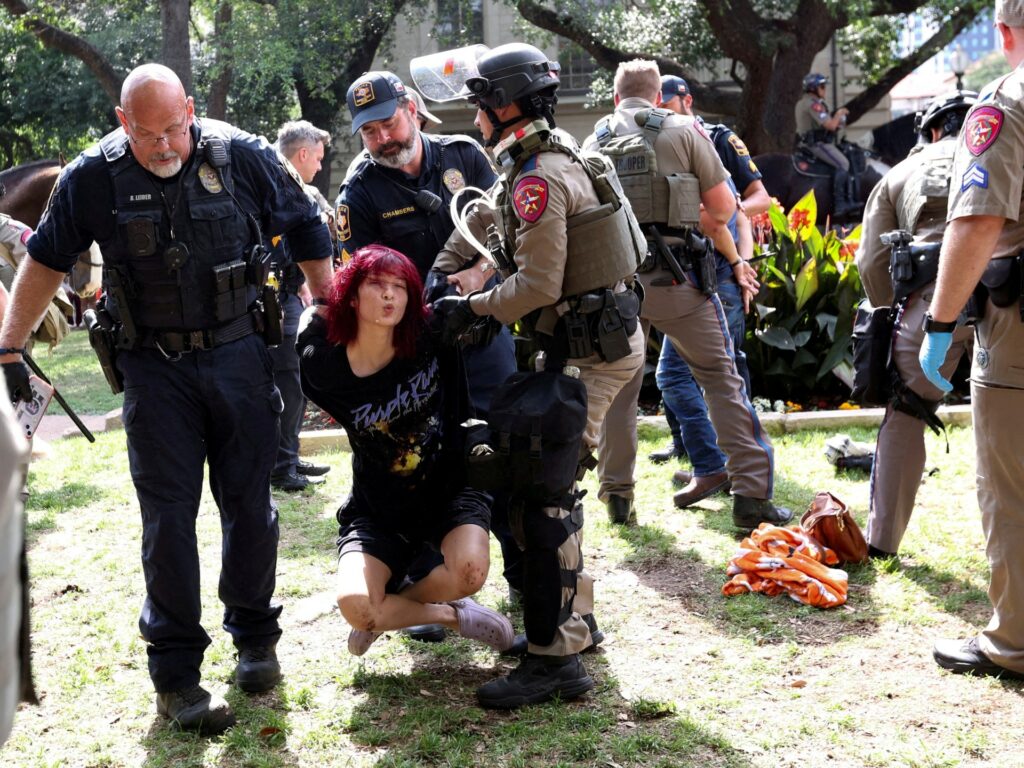Amid escalating protests against Israel’s war on Gaza, over 100 students were arrested at the University of Texas at Austin and the University of Southern California. The demonstrations, which began at Columbia University in New York, have spread to various campuses across the United States.
Students are demanding that universities sever financial ties with Israel and divest from companies supporting the ongoing conflict in Gaza, where thousands of Palestinians have lost their lives. The protests have been largely peaceful but have faced heavy-handed responses from university authorities, with accusations of anti-Semitism being leveled against participants.
At UT Austin, hundreds of students staged a walkout and march, planning to set up an encampment on campus. However, police in riot gear were called in to disperse the crowds, resulting in the arrest of at least 34 individuals. Similar scenes unfolded at USC in Los Angeles, where police arrested dozens of students who were peacefully protesting against the war in Gaza.
Despite threats of disciplinary action and arrests, students at Harvard, Brown, and Columbia universities have continued to demonstrate in solidarity with Palestinians. Calls for divestment from Israel and the restoration of a pro-Palestine student group have been central to their demands.
Critics, however, including House Speaker Mike Johnson, have accused protesters of anti-Semitism and called for harsh measures to be taken against them. Despite these challenges, students remain committed to exercising their right to free speech and peaceful protest.
As tensions continue to rise, the debate over academic freedom, free speech, and the right to protest on college campuses remains at the forefront of the ongoing demonstrations. The White House has expressed support for free speech, emphasizing the importance of open dialogue and nondiscrimination in academic settings.
#Students #arrested #California #Texas #Gaza #war #protests #intensify
Long-Term Implications and Future Developments
The student-led protests against Israel’s war on Gaza in the United States have escalated in recent days, with more schools joining in solidarity with Palestinians. The arrests of over 100 students at the University of Texas at Austin and the University of Southern California highlight the intense response from law enforcement and university officials.
One potential long-term implication of these protests is the impact on university policies and relations with Israel. The demand for universities to cut financial ties and divest from companies supporting Israel’s actions in Gaza could lead to changes in investment strategies and partnerships. This could also spark discussions on academic freedom and freedom of speech on college campuses.
Another possible future development is the continuation and expansion of protests across more universities in the US. As students at Harvard, Brown, and Columbia universities have already set up encampments and faced threats of disciplinary action, we may see more demonstrations demanding accountability for Israel’s actions in Gaza. The involvement of prominent political figures like House Speaker Mike Johnson and potential calls for National Guard intervention could further escalate tensions.
Actionable Advice
1. **Support Dialogue**: Encourage open and respectful dialogue between students, university officials, and law enforcement to address concerns and find peaceful resolutions to protests. Promote understanding of diverse perspectives and prioritize peaceful communication.
2. **Protect Freedom of Speech**: Uphold the rights of students to express their views and engage in peaceful protests. Universities should safeguard academic freedom and ensure that all voices are heard, regardless of political or ideological differences.
3. **Promote Education and Awareness**: Organize educational events, workshops, and discussions on the Israel-Gaza conflict to raise awareness and foster informed conversations. Encourage critical thinking and empathy to bridge divides and promote understanding.
4. **Engage in Diplomacy**: Advocate for diplomatic solutions to the Israel-Gaza conflict and support efforts towards peace and reconciliation. Encourage students to engage in advocacy and activism through peaceful means and constructive dialogue.
By taking proactive steps to address the long-term implications of the protests and promoting peaceful engagement, universities can create a conducive environment for dialogue, understanding, and positive change. It is essential to prioritize communication, respect for diverse perspectives, and the protection of freedom of speech to navigate these challenging times effectively.

